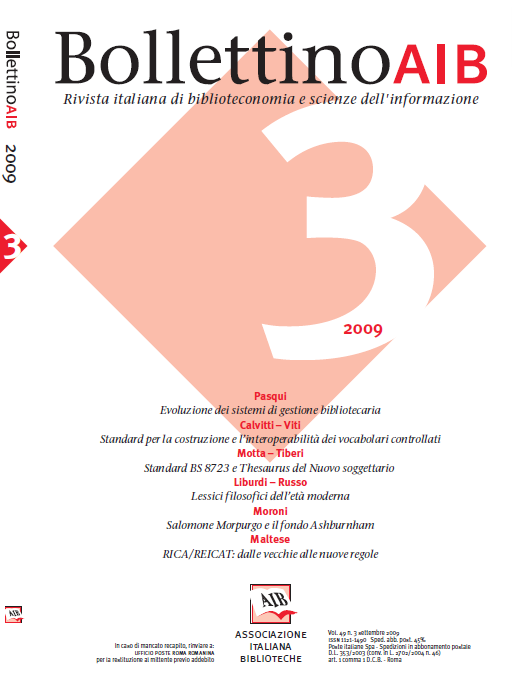Salomone Morpurgo and the Ashburnham collection (with unpublished letters to Ernesto Monaci and Giosue Carducci)
Main Article Content
Abstract
The article tells about the return to Italy of the Ashburnham manuscripts, all included in the Report to the Chamber of Deputies, that was needed by the young Italian Parliament to provide a large sum of money to bring back that important collection to the place from which it had been subtracted through various events.
On the death of the Lord, in June 1878, the library, together with other property, passed to the eldest son, the new Lord Ashburnham, who put the library up for sale. It was sold in three blocks: the"Books" and"Appendixes" collection was bought by the Italian government which was able to count on the sum of 585,000 golden lire. For Italy the purchases were made, on behalf of the government, by Pasquale Villari who wished to be accompanied by numerous men of culture, especially Carducci, who considered the occasion of the greatest importance for the reconstruction of ancient Italian literary history.
On 4th December 1884 the collection was brought to the Biblioteca Medicea Laurenziana (Laurentian Medicean Library).
Among those who were able to consult the London collection before it was dismembered was Salomone Morpurgo. He was struck by the incredible number of manuscripts (most of which Italian) in Lord Ashburnham's possession. Many of these were autographed and sought after by scholars in Italy.
When faced with the vastness of the collection, the scholar understood immediately the cultural value of those texts and, when he discovered that Ashburnham wished to sell the entire library, through a series of letters he tried to move intellectuals and scholars to convince the young Italian Parliament to provide the money necessary to achieve this result.
He had grasped immediately that the purchase of the precious manuscripts would have formed a unique occasion for the correct processing of all Italian literary history.
Most of the letters addressed to Salomone Morpurgo have been lost; those written by him, due also to the racial laws, suffered the same destiny, except for some small nuclei in public and private archives, that had not been put in order and as a result the Fascist government bodies were unable to eliminate them. There are therefore some good collections in the Monaci Collection in Rome, in the Archive of Casa Carducci in Bologna, in the Ancona collection and in the Barbi collection of Pisa. In the appendix at the end of the article there are some unpublished letters to Ernesto Monaci and to Giosuè Carducci.
On the death of the Lord, in June 1878, the library, together with other property, passed to the eldest son, the new Lord Ashburnham, who put the library up for sale. It was sold in three blocks: the"Books" and"Appendixes" collection was bought by the Italian government which was able to count on the sum of 585,000 golden lire. For Italy the purchases were made, on behalf of the government, by Pasquale Villari who wished to be accompanied by numerous men of culture, especially Carducci, who considered the occasion of the greatest importance for the reconstruction of ancient Italian literary history.
On 4th December 1884 the collection was brought to the Biblioteca Medicea Laurenziana (Laurentian Medicean Library).
Among those who were able to consult the London collection before it was dismembered was Salomone Morpurgo. He was struck by the incredible number of manuscripts (most of which Italian) in Lord Ashburnham's possession. Many of these were autographed and sought after by scholars in Italy.
When faced with the vastness of the collection, the scholar understood immediately the cultural value of those texts and, when he discovered that Ashburnham wished to sell the entire library, through a series of letters he tried to move intellectuals and scholars to convince the young Italian Parliament to provide the money necessary to achieve this result.
He had grasped immediately that the purchase of the precious manuscripts would have formed a unique occasion for the correct processing of all Italian literary history.
Most of the letters addressed to Salomone Morpurgo have been lost; those written by him, due also to the racial laws, suffered the same destiny, except for some small nuclei in public and private archives, that had not been put in order and as a result the Fascist government bodies were unable to eliminate them. There are therefore some good collections in the Monaci Collection in Rome, in the Archive of Casa Carducci in Bologna, in the Ancona collection and in the Barbi collection of Pisa. In the appendix at the end of the article there are some unpublished letters to Ernesto Monaci and to Giosuè Carducci.
Article Details
Section
Articles

This work is licensed under a Creative Commons Attribution-ShareAlike 4.0 International License.
